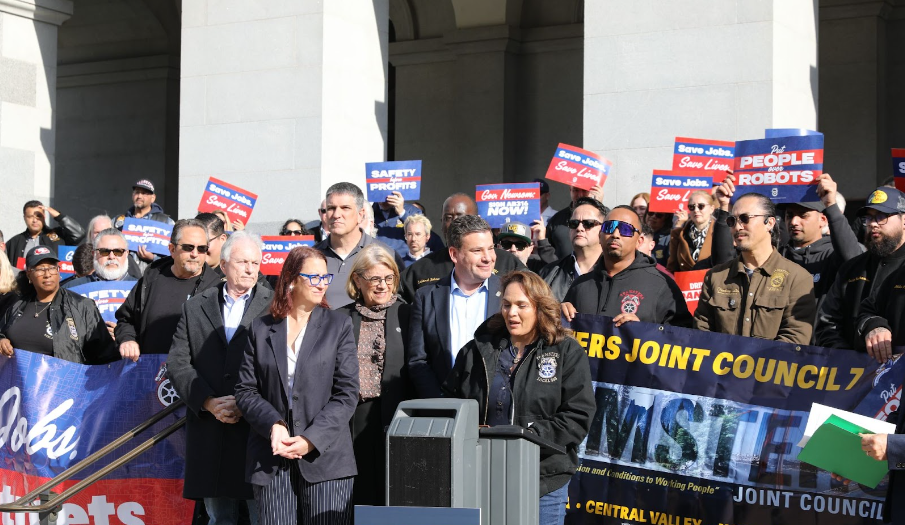California
California Teamsters, Elected Officials Reintroduce AV Human Operator Bill

Legislation Would Protect Middle Class Jobs, Motorist Safety
Press Contact: Matt McQuaid Phone: (202) 624-6877 Email: mmcquaid@teamster.org
(SACRAMENTO, Calif.) – Teamsters, California lawmakers, and labor allies gathered at the statehouse in Sacramento today to announce the reintroduction of legislation requiring a trained human operator behind the wheel of self-driving trucks weighing more than 10,000 lbs. Assembly Bill 2286 (AB 2286), formerly Assembly Bill 316 (AB 316), is part of the CARS package that the Teamsters are advocating for in Sacramento, alongside Senate Bill 915. Full video of the event can be found here.
“As autonomous vehicle companies try to push their new, untested technology onto our roads, we need to prioritize legislation that will protect our streets and good-paying driving jobs, and that starts with AB 2286,” said Peter Finn, Teamsters International Western Region Vice President, President of Teamsters Joint Council 7. “We’ve seen the destruction that small robotaxis can cause, injuring pedestrians and preventing first responders from doing their job. We cannot allow driverless vehicles weighing ten times that of a robotaxi onto our roads without a human operator. That’s why the Teamsters are calling on California policymakers to pass AB 2286.”
The AV human operator bill was first introduced by Assemblymember Cecilia Aguiar-Curry (D – Winters) in January 2023 and received overwhelming bipartisan support in the legislature, with more than 90 percent of California lawmakers voting in favor of the legislation. According to a 2023 poll, nearly three-quarters of California voters across party lines, gender, geography, and all other demographics also said they support having a human operator behind the wheel of autonomous trucks.
“I’ve reintroduced this bill because the Legislature’s role is critical in deciding when autonomous trucking is safe and when there is a REAL plan for our trucking workers,” said Assembly Majority Leader Cecilia Aguiar-Curry (D-Winters). “The autonomous trucking industry has cast this bill as a ban on technology when it explicitly states that testing and deployment will happen with a Human Safety Operator. Using their logic, they’re the ones who support a ban. A ban on humans in trucks. A ban on working people’s ability to provide for their families and provide safe roadways for Californians. We will not stand by and let them put profits over people.”
“All eyes are watching to see if California will take the first step towards passing common sense autonomous vehicle regulation. AB 2286 is not a ban on self-driving technology – it is a bipartisan bill that puts safety first by ensuring a trained human operator behind the wheel of autonomous trucks,” said Chris Griswold, Teamsters International Vice President At-Large, President of Teamsters Joint Council 42. “If we learned anything last year, it was that autonomous vehicles are not ready for prime time. We cannot keep making the same mistake and allowing Big Tech to run the show at the expense of public safety. California needs to pass AB 2286.”
Since Governor Gavin Newsom vetoed AB 316 in September 2023, robotaxis have wreaked havoc on California streets, with one Cruise robotaxi running over a pedestrian and dragging her 20 feet in San Francisco. In the wake of this safety incident, the U.S. Department of Justice has opened an investigation into Cruise, while San Francisco has brought a lawsuit against the California Public Utilities Commission (CPUC) for allowing for the expansion of robotaxis in the city. Last week, an additional investigation was opened into Cruise after reports that the vehicles nearly collided with children in two separate incidents, and a Waymo robotaxi crashed into a cyclist in San Francisco.
In addition to Assemblymember Aguiar-Curry, Teamsters were joined by Assemblymembers Tom Lackey (R – Boron) and Laura Friedman (D – Glendale).
“Artificial Intelligence needs to be developed and implemented in a way that benefits everyone – not just wealthy shareholders who only care about the bottom line. So, I urge all California elected officials to please listen to professional drivers like me who operate this machinery every day,” said Julia Sandoval, a Recology driver and member of Teamsters Local 350. “We know big trucks and we know California roads. Please, protect public safety and middle-class prosperity in California by supporting AB 2286.”
The Teamsters are committed to protecting good-paying union jobs, keeping dangerous autonomous vehicles off our streets, and ensuring local communities have a say in AV deployment and regulation. Earlier this month, the Teamsters held a rally to announce the introduction of SB 915, a bill that would give California’s local municipalities more authority over such regulations. The growing statewide support for AV safety measures comes as Waymo seeks to expand its robotaxi operations in California.
Founded in 1903, the International Brotherhood of Teamsters represents 1.3 million hardworking people in the U.S., Canada, and Puerto Rico. Visit Teamster.org for more information. Follow us on Twitter @Teamsters and “like” us on Facebook at Facebook.com/teamsters.

California
California residents flee massive wildfire sparked by burning car

Thousands of Northern California residents were forced to evacuate their homes as a massive wildfire scorched more than 250 square miles. The Park Fire, California’s largest this year, was started by a man who pushed a burning car into a gully.
California
California's billionaire utopia faces a major setback

Silicon Valley’s billionaire-backed plan to turn 60,000 acres into a utopian “city of yesterday” is officially delayed by at least two years. California Forever confirmed on July 22 that its “East Solano Plan” rezoning proposal will not appear on the region’s November election ballot. Instead, the $900 million project will first receive a full, independent environmental impact review while preparing a development agreement with local county supervisors.
Speaking with The New York Times this week, California Democratic state senator John Garamendi said, “The California Forever pipe dream is in a permanent deep freeze.”
First unveiled in August 2023 after years of stealth land purchases just outside San Francisco, organizers bill the 60,000 acre East Solano Plan as a multistep campaign to build “one of the most walkable and sustainable [towns] in the United States.” Concept art on California Forever’s website depicts idyllic pedestrian squares and solar farms, with lofty promises to bring hundreds of thousands of jobs to the area along with “novel methods of design, construction, and governance,” according to a previous profile. Overseen by former Goldman Sachs trader Jan Sramek, California Forever received financial backing from wealthy venture capitalists including LinkedIn’s co-founder Reid Hoffman and Lauren Powell Jobs, billionaire philanthropist and widow of Steve Jobs.
[ California’s billionaire utopia may not be as eco-friendly as advertised.]
But from the start, locals, environmental advocates, and politicians pushed back against the East Solano Plan. By November 2023, news broke that California Forever’s parent company previously sued a group of locals for $510 billion, citing antitrust violations after the defendants refused to sell their land (the locals later agreed to sell for $18,000 per acre). Meanwhile, state representatives voiced security concerns about the proposed city’s proximity to the nearby Travis Air Force Base.
Last month, the accredited Solano Land Trust announced its opposition to the plan, citing what it believed would be a “detrimental impact” to the region’s “water resources, air quality, traffic, farmland, and natural environment.” The land trust also alleged California Forever backers misled the public by describing much of the area as “non-prime farmland” with “low quality soils.” In reality, the Solano Land Trust explained that the “sensitive habitat… home to rare and endangered plants and animals” includes some of the state’s most water-efficient farmland.
In this week’s announcement, Sramek claims a recent poll conducted by California Forever indicated 65 percent of East Solano residents “support development of good paying jobs, more affordable homes, and clean energy,” while noting that “most voters are also asking for a full environmental impact report to be completed first.”
“The idea of building a new community and economic opportunity in eastern Solano seemed impossible on the surface,” Sramek wrote to Popular Science last year. “But after spending a lot of time learning about the community, which I now call home, I became convinced that with thoughtful design, the right long-term patient investors, and strong partnerships… we can create a new community.”
California
Tech Jobs Keep Moving Out of California. Don’t Panic Yet.

It has been a weird four years for California’s technology sector. It boomed early in the Covid-19 pandemic as people in the US and around the world geared up for remote work and directed their spending to online services (games, streaming, spin classes, etc.) they could consume without leaving home. But that rise in remote work, combined with highest-in-the-nation real estate costs, strict pandemic rules and other factors, also led to something of an exodus from the state’s coastal cities, with high-profile departures of tech leaders in 2020 and 2021 and even occasional claims that the San Francisco Bay Area’s reign as global tech capital was ending.
A few high-profile departures are still taking place, with Elon Musk announcing this month that he will be moving the headquarters of two more of his companies — X, the former Twitter, and SpaceX — from California to Texas, where he moved Tesla Inc.’s headquarters in 2021. But there have also been stories of tech leaders returning and San Francisco beginning a resurgence, with the boom in generative artificial intelligence — the biggest story in tech now — very much concentrated around the San Francisco Bay. My fellow Bloomberg Opinion columnist Conor Sen thinks it might even be a good time to buy some slightly marked-down San Francisco real estate.
-

 World1 week ago
World1 week agoOne dead after car crashes into restaurant in Paris
-

 Midwest1 week ago
Midwest1 week agoMichigan rep posts video response to Stephen Colbert's joke about his RNC speech: 'Touché'
-

 News1 week ago
News1 week agoVideo: Young Republicans on Why Their Party Isn’t Reaching Gen Z (And What They Can Do About It)
-

 Movie Reviews1 week ago
Movie Reviews1 week agoMovie Review: A new generation drives into the storm in rousing ‘Twisters’
-

 Politics1 week ago
Politics1 week agoFox News Politics: The Call is Coming from Inside the House
-

 News1 week ago
News1 week agoIn Milwaukee, Black Voters Struggle to Find a Home With Either Party
-

 News1 week ago
News1 week agoVideo: J.D. Vance Accepts Vice-Presidential Nomination
-

 World1 week ago
World1 week agoTrump to take RNC stage for first speech since assassination attempt
















